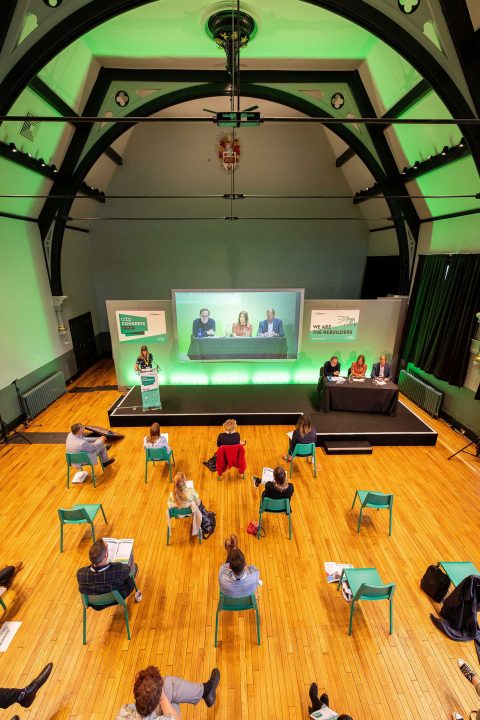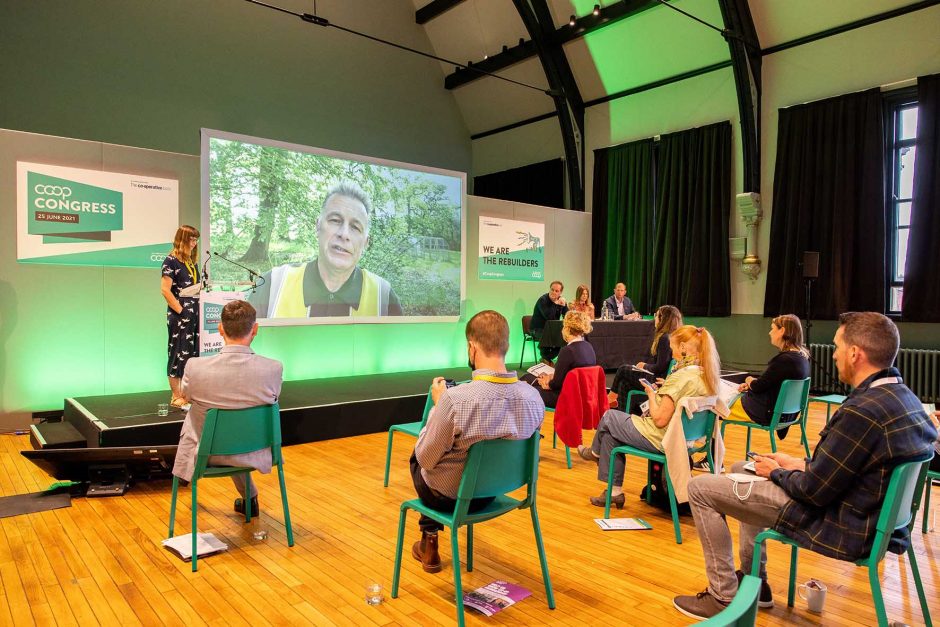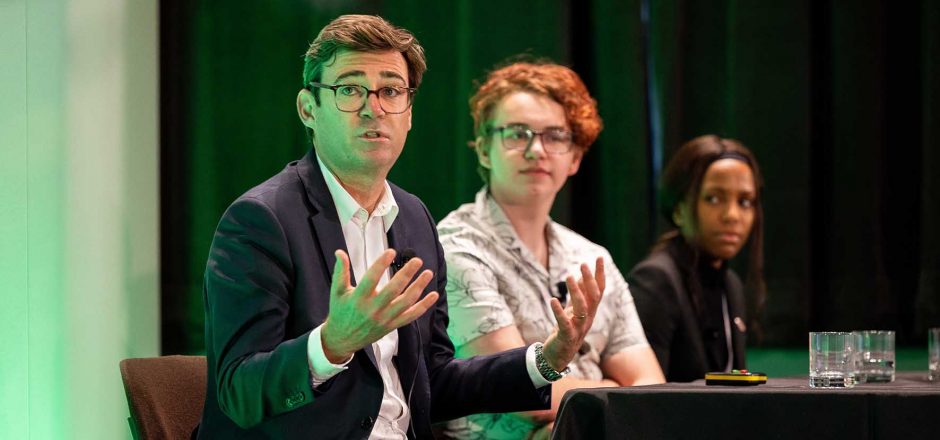The 2021 UK Co-operative Congress was held on Friday 25 June as a hybrid event during Co-op Fortnight, with around over 300 delegates engaging in person or online. The theme was ‘We Are The Rebuilders’, with speakers addressing issues of community and local economy, campaigning, youth participation and the need for people outside of the co-op movement to learn about what co-ops are and why they matter.
Communities and local economies
“10 years ago, nobody had heard of community shares,” said James de la Vigne, head of Co-operatives UK’s development unit, introducing the session. “Yet, since 2012, over £155m has been raised by 100,000 investors, supporting over 444 local community co-ops. 92% of those are still trading today – that’s a phenomenal testimony to the community work happening in our country.”
One of those community co-operatives is Stretford Public Hall, built for the local community by John Rylands in 1878, which hosted the in-person element of Congress. In 2015, the Friends of Stretford Public Hall took over its running, with the aim of restoring it into a multi-purpose community venue.
“The hall had fallen into disrepair, and in 2014 residents mobilised to save the building from falling into private ownership or even demolition,” said Simon Borkin, Stretford Public Hall project organiser and board member. “In 2017 we launched our community share offer and we invited our community to invest. People could pay in instalments, and by the time we had closed the share offer we had raised £255,000 from 790 community investors and also several organisations.”
Today the Hall holds art, music and wellbeing classes and activities, offers a co-working space and also acts as the constituency office for Kate Green, MP for Stretford and Urmston and Shadow Education Secretary.

Joining the session virtually, Dan Jarvis, mayor of Sheffield City Region, explained how his area’s strategic economic plan “deliberately and specifically talks about the role of co-operatives and other forms of social enterprises; we’ve done that as we believe they can make people more empowered and happier”.
Mr Jarvis said there are 236 co-operative businesses active in South Yorkshire with a combined annual turnover of almost £100m, employing around 1,000 people.
Related: A look at this year’s Co-operative Economy Report
The region is using its devolved revenue to create a renewal fund. “Half of this 500m investment pot will be used to invest in local businesses – including co-operatives – because we’re looking to give people more power, increase their involvement with policymaking and strengthen the community. It’s a really important point because one of the defining aspects of co-operation and employee ownership is the way that they both generate trust, and help unleash the potential of enterprise.”
Mr Jarvis added: “We need to empower local and regional governments to bring control closer to the people and harness our local knowledge and our commitment to our communities. Because by doing that, we can really unleash our communities’ real potential. Doing that right across the UK could help us address the deep disillusion and discontent which is undermining the fabric of our country.”
Social change campaigning
The headline speaker for Congress was naturalist, environmental campaigner and broadcaster Chris Packham, who spoke about what makes an effective campaign, and the need for co-ops to get involved in and campaign on issues affecting people and places today.
“There are many ways that we can actively and peacefully do great things when it comes to social campaigning,” said Mr Packham, highlighting how the co-op movement itself has a long history of social campaigning in areas such as modern slavery, diversity in leadership, quality of care for staff and compostable plastic bags.
“At this point in time, it’s really important we focus some of our campaigning on the environment, because it’s in deep trouble. We’ve got 10 years to prevent a 1.5 degree increase in global temperature; if that happens, the results will be catastrophic.”

Mr Packham believes that many people don’t put the environment at the forefront of their agenda because of “a pervasive, arrogant misconception that we are no longer a part of nature” and because right now issues such as climate change are not obviously hurting most people in the UK. But he also believes there is a growing will to do something about this – and that co-ops are a space where this will could be nurtured.
“[A co-operative is] a place where people share ideas, and they share a vision. But we need to realise that vision. In order to do that we need to change people’s minds and their practices – and that means campaigning,” he said.
Related: Young people’s summit announced at Co-op Congress
“To have a successful campaign, we need to exercise a degree of imagination […] the more sparkly those ideas are, the better. Recognise who you are campaigning to: know your audience and tailor your campaign to fit that; and empower the people that have been campaigning to make a difference.
“Co-ops have a long legacy; we want a long legacy again in the future, which means that we have to ensure that future – and the time to do that is now.”
The session also heard from representatives of four of the UK’s largest retail societies, who identified that most of the campaigning issues they work on fall into four broad headings: diversity and inclusion; customer and staff safety; climate action; and food security.
“Our advocacy has always been most powerful when we combine what we do and what we say,” said Paul Gerrard, campaigns and public affairs director at the Co‑op Group. “Co-operative campaigns deliver meaningful, sustainable change, including where our members live and work. Co-op campaigns are always practical.”
He added that when planning quality campaigns, there are four things co-ops need to keep in mind: that they are on issues that are important; that those issues are relevant to members, and by extension to the retail societies, which then allows those societies to use their assets in service of that campaign; that they advocate practical creativity “that is unequivocally co-operative in nature” to solve the problem; and that it includes members in developing and advocating the campaign.
Debbie Robinson, CEO of Central England Co-operative, spoke about how the UK retail societies had come together to campaign on colleague safety. “450 people got up today to go work in retail. And today they will suffer abuse and violence. […] We won’t stop as co-operatives until the law changes and our colleagues are better protected. Because we believe everybody has the right to go to work and return home safely. That’s not too much to ask.”
As part of this campaign she urged co-operators to write to local MPs by 5 July in support of the Police, Crime, Sentencing and Courts Bill, which provides an opportunity to enact legislation that aims to better serve victims, protect communities and rehabilitate offenders. “The issue of colleague safety is live,” she said, “We have an opportunity to make a massive change.”
Joining the Congress by video was Gemma Lacey, director of sustainability and communications at Southern Co‑operative, who explained how the UK hosting the 26th Climate Change Conference (COP26) was “a real opportunity to start to talk about how we – as individuals, organisations and movements – can take action working together to create a sustainable future”.
She added: “The first step is recognising the need for action, understanding about climate and ecological impacts, and making commitments [that are] rooted in and apply to organisational strategy. Given the urgency it’s got to be bold, but taking a step on that pathway is what is most important.
This pathway could include reducing energy consumption and emissions from refrigeration, sourcing energy from renewable sources, supporting renewable energy and community power schemes, writing responsible investment strategies, working with farmers and suppliers to tackle supply chain emissions, working on reducing product packaging and food waste, transitioning to electric vehicles or enabling habitat restorations, making space for nature.
Related: Q&A with wildlife campaigner Chris Packham
Pete Westall, chief values officer at Midcounties Co-operative, spoke about the joint work of UK retail societies in the area of food justice and the “inspirational leadership of Marcus Rashford, who single handedly changed the scene of social campaigning in the UK for the better” – and praised the Co-op Group’s work around community fridges (with Hubbub) and nutritious recipes (with Rashford and chef Tom Kerridge).
He added: “As co-ops, we are in a really strong position to make a difference because of our positions in communities, because of our members and because of our colleagues. […] Food banks do something, right at this moment, to alleviate need, but they’re not the future. It’s social change and social campaigning that can make a difference to that future.”
A new era of co-operation
In the UK, the leaders of four of the co-operative movement’s support organisations – the Co-operative Heritage Trust, Co-operative College, Co-op News and Co-operatives UK – are currently led by women. In a special session chaired by Melissa Johns, actor and co‑director of TripleC (a collective on disabled and non-disabled creatives), these women spoke about the importance of sharing the UK’s ‘best kept secret’ with a wider public audience.
Liz McIvor, manager of the Co‑operative Heritage Trust, shared images from the Co-operative Archive that highlighted the movement’s long involvement in social justice. “There are so many things throughout the movement, game changes that we should all be really proud of, like the invention of new technologies, fair conditions for workers and the rights for women to vote.
“The joy of accessing items from the archive isn’t to say ‘look, these are our past glories’, but to ask: ‘How can we learn from that? What are the challenges at the time? How did people move on? And how do we use that knowledge today?’”
Cilla Ross, interim principal of the Co‑operative College, described the role of the College and co-operative education “not just in teaching about co-ops, but in teaching how to be a co-operator”, adding that the College’s international work has always been central to its mission.
“The United Nations increasingly sees co-ops as central to international development,” she said, speaking about the work of the Co-operatives Europe Development Platform, and how co-ops support the UN’s sustainable development goals (SDGs).
Rebecca Harvey, executive editor of Co-op News, gave examples of the spread and scope of co-operative businesses around the world. “Co-ops are everywhere, in every sector, in every country,” she said, giving examples from the technology, music and environmental sectors from the UK and internationally.
“There is a whole world of co-ops out there that people have never heard of – and they have never heard of it because there is no education about co-ops in schools, and the communities that used to exist around co-ops don’t exist any more, so the word of mouth and mainstream media coverage isn’t there either. This all needs to change.”
Rose Marley, chief executive of Co‑operatives UK, highlighted how the pandemic shone a light on inequalities. “Co-ops really level out that inequality. There are two important things: the distribution of power and the distribution of wealth. Co-ops anchor wealth in the community that they’re operating in [and] right now we need to build that community. This business model has been tried and tested for 175 years. It’s not a gimmick. And so I really feel passionately, that now is the time to tell everybody about it. It has to be about communication. All of these wonderful things are happening. The world just needs to know about them.”
Delegates also heard from Lord Victor Adebowale (by video), chair of Social Enterprise UK and a director of the Co-op Group, who spoke on the importance of co-operatives and social enterprises working better together, and the importance of representative leadership –particularly female leadership and experienced leadership. “It’s about living in a world where people with that lived experience, who have experienced racism and discrimination, being in leadership roles so that we can better create the right pathways that represent the world that we live in,” he said.
Engaging the next generation
The final session of the event saw Co-op Group CEO Steve Murrells speaking about how his organisation is looking at the youth challenge through three lenses: “One lens where we can actually make young people be heard and have a voice, one lens where we can help young people make a real difference, and a third lens around access to new opportunities.”
He said: “If we’re going to play our part in helping the country build back better, but also build back different, it’s going to be critical for us that we align businesses with the public service sector and organisations to create roles and opportunities for young people. Covid has shone a light on the unfairness in society, and no more so in the area of inequality. We can see that gap widening – and we can see a really widening for young people.“
Andy Burnham, mayor of Greater Manchester, added: “There’s a whole range of challenges young people have and it’s about saying to them: this is a solution for you to use, co-ops are something different. This is about empowering them with co-op ownership, which I think speaks to the ways this generation thinks and works.

The session featured three young people – Annabelle Cook (by video), Tommy Kirkwood and Shekinnah Wilberforce – who were all involved in the Our Pass initiative, a membership scheme for young people who live in Greater Manchester, piloted by Mr Burnham, which provides free bus travel and offers and experiences.
“I think having one member, one vote enables young people to be heard, and this goes back to the importance of youth voice,” said Ms Wilberforce. “It enables young people to be part of the process and enables them to make decisions.”
Tommy Kirkwood, who also sits on the Co-op Young Members Group, the Greater Manchester Youth Combined Authority and recently helped set up an electronics refurbishment co-op, spoke about some of the age-related barriers for young people trying to set up co-operatives, including the fact that only one high street bank allows directors under 18 to set up a business account.
Also joining the panel was Maria Cearns, managing director (customer and people) at the Co-operative Bank, which supported the event. “I am delighted to announce today that The Co-operative Bank is going to fund work with Co-operatives UK and The Co-op Foundation to engage young people in co-ops,” she said.
The three organisations will be calling a national Youth Summit on Co-operation in the autumn, to include a day of workshops and panels to explore what the challenges are – and most importantly, where the opportunities are for young people today.